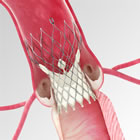|
The study evaluated 150 patients from the CoreValve U.S. Pivotal Trial (23 percent of the extreme risk patient group) who were not suitable for traditional transcatheter aortic valve replacement (TAVR) through the femoral artery, and therefore were treated via subclavian or direct aortic approaches. These patients were more ill and frail than patients treated transfemorally, with higher rates of peripheral vascular disease (61.3 percent of alternate access patients versus 35.2 percent of transfemoral patients, p=0.001). These patients also had significant rates of severe lung disease (39.3 percent of alternate access patients versus 23.5 percent of transfemoral patients, p<0.001) and home oxygen therapy (44.0 percent of alternate access patients versus 29.9 percent of transfemoral patients, p=0.002). The rate of all-cause mortality or major stroke for these patients was 39.4 percent at 12 months (compared to 26.0 percent in patients treated transfemorally), an acceptable rate given the higher risk nature of these patients. Rates of moderate or severe aortic regurgitation were low (2.4 percent at one year) and 85.7 percent of these patients improved at one year. Upon the completion of the Extreme Risk Study, 339 additional patients were treated via a subclavian or direct aortic approach in the Continued Access Study. The mortality rate in the pivotal alternate access patients was 11.3 percent, and in the Continued Access Study this rate improved to 9.5 percent (both at 30 days). Also in the Continued Access Study compared to the pivotal trial, rates of major stroke at 30 days (3.0 percent vs. 7.5 percent, p=0.03) and major vascular complications (4.2 percent vs. 8.7 percent, p=0.04) were significantly reduced. "The data presented today demonstrate that multiple implant approaches with the CoreValve System provide positive alternatives for very sick patients who have no other options. These data show that more patients can safely and successfully be treated," said Michael Reardon, M.D., professor of cardiothoracic surgery at The Methodist DeBakey Heart & Vascular Center in Houston. The CoreValve System was designed specifically to serve a broad range of TAVR patients. The device has a small 18Fr profile for all valve sizes, which minimizes trauma at implant and allows physicians to treat patients with small or calcified vasculature. Its Nitinol frame is designed to prevent unwanted leakage and optimize blood flow. In addition, the CoreValve System is available in the broadest range of sizes available, so patients who have smaller, larger or in-between sizes can be accommodated. The Medtronic CoreValve U.S. Pivotal Trial's extreme risk study evaluated the self-expanding device in patients who were considered too ill or frail to have their aortic valves replaced through traditional open-heart surgery. In the rigorous study, all patients were monitored by independent core labs and evaluated against a pre-approved performance goal. Physician "heart teams" were comprised of leading cardiac surgeons and interventional cardiologists in accordance with the U.S. Food and Drug Administration approved protocol. The CoreValve System was approved by the U.S. Food and Drug Administration (FDA) in January 2014 for patients considered extreme risk for surgery. Since receiving CE (Conformité Européenne) Mark in 2007, the CoreValve System has been implanted in more than 50,000 patients in more than 60 countries. The CoreValve System is not yet approved in the U.S. for other patient groups. In collaboration with leading clinicians, researchers and scientists worldwide, Medtronic offers the broadest range of innovative medical technology for the interventional and surgical treatment of cardiovascular disease and cardiac arrhythmias. The company strives to offer products and services that deliver clinical and economic value to healthcare consumers and providers around the world. About Medtronic Any forward-looking statements are subject to risks and uncertainties such as those described in Medtronic's periodic reports on file with the Securities and Exchange Commission. Actual results may differ materially from anticipated results. Source: Medtronic, Inc. |

